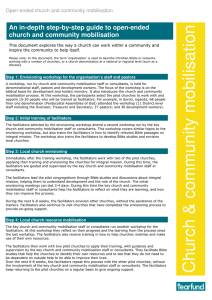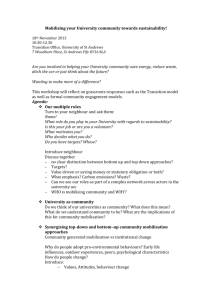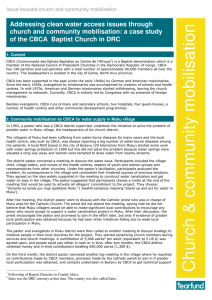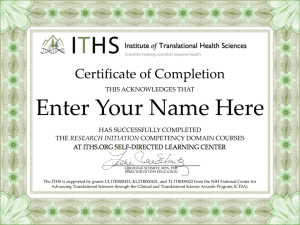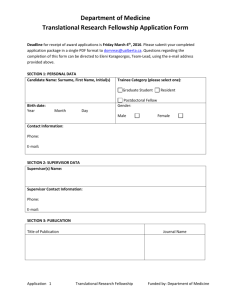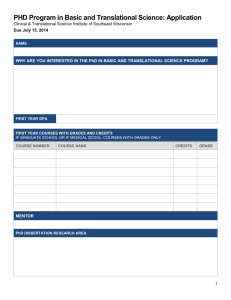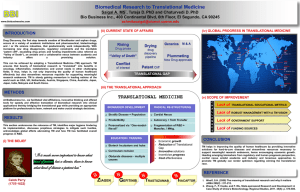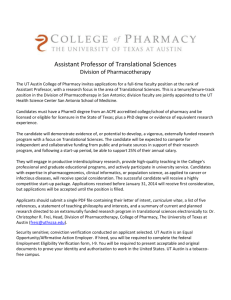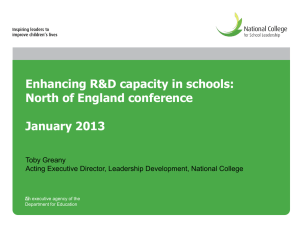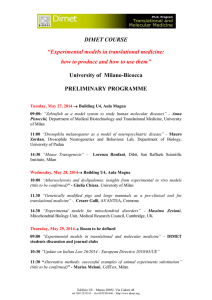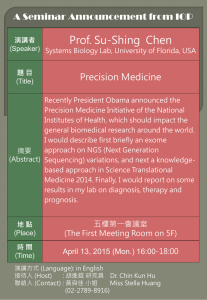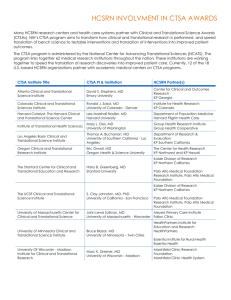01 Editorial La Velle
advertisement
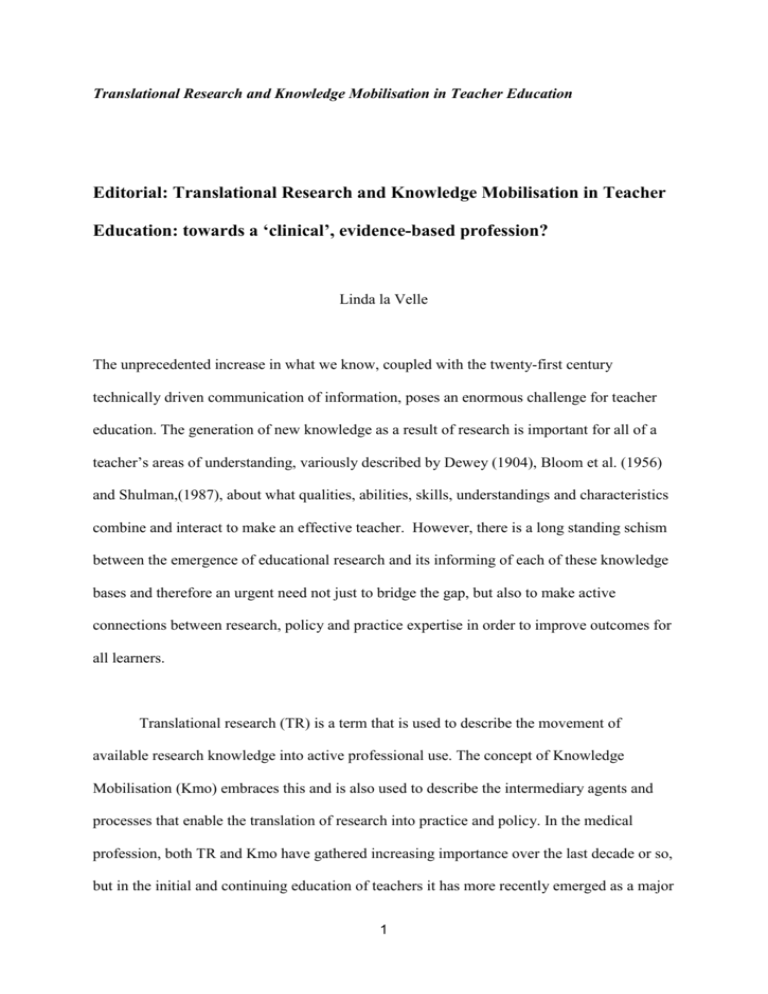
Translational Research and Knowledge Mobilisation in Teacher Education Editorial: Translational Research and Knowledge Mobilisation in Teacher Education: towards a ‘clinical’, evidence-based profession? Linda la Velle The unprecedented increase in what we know, coupled with the twenty-first century technically driven communication of information, poses an enormous challenge for teacher education. The generation of new knowledge as a result of research is important for all of a teacher’s areas of understanding, variously described by Dewey (1904), Bloom et al. (1956) and Shulman,(1987), about what qualities, abilities, skills, understandings and characteristics combine and interact to make an effective teacher. However, there is a long standing schism between the emergence of educational research and its informing of each of these knowledge bases and therefore an urgent need not just to bridge the gap, but also to make active connections between research, policy and practice expertise in order to improve outcomes for all learners. Translational research (TR) is a term that is used to describe the movement of available research knowledge into active professional use. The concept of Knowledge Mobilisation (Kmo) embraces this and is also used to describe the intermediary agents and processes that enable the translation of research into practice and policy. In the medical profession, both TR and Kmo have gathered increasing importance over the last decade or so, but in the initial and continuing education of teachers it has more recently emerged as a major 1 issue, but not without controversy. In his paper to the UK’s Department for Education, Ben Goldacre (himself a clinician) wrote that the policy for research-informed practice is “to gather evidence on what works best, and then, crucially, to get it read, understood, and put into practice” (Goldacre 2013, 7). However, this apparently obvious approach had already powerfully been refuted by Gert Biesta in his critical analysis of the notion of evidence-based practice in education with a focus on the scientific and democratic control over both educational practice and research (Biesta, 2010). More recently, Clemens Wieser, quoting Polanyi (1998) has argued that that findings created in research are available as codified knowledge, while the practice of teaching relies on both personal and practical knowledge (Weiser, 2015). Developing this from the work of Cain (2015), who suggested that the evidence and arguments [for knowledge mobilisation] suggest a more complex relationship involving knowledge transformation, not merely knowledge mobilisation, Wieser (ibid.) outlines a taxonomy of three interrelated areas of teachers’ knowledge: research knowledge, personal knowledge and practical knowledge. This brings us back to a consideration of the forms of knowledge that teachers need during their initial training and for continuing effective practice and how this knowledge, as it unfolds, may be made available to them. This special edition seeks to demonstrate and exemplify, from a number of international perspectives, some of the many challenges faced in this continuing phase of the information revolution. The scene is set in the first paper by Richard Proctor, who reports on a UK study of teachers’ individual and institutional use of research and the value that they place on research findings and research practices more generally. A value-practice gap is demonstrated in 2 which a consistent divide exists between the extents to which teachers value the use of research and that to which they actually use the research in their everyday practice. Tim Cain then takes up the thread with his paper discussing his findings, again looking at UK teachers’ use of research, which he categorizes as either ‘instrumental’, ‘conceptual’ or ‘strategic’. Using innovative methodology and analysis, Cain provides empirical evidence that teachers’ instrumental and strategic use of research was very infrequent, whilst conceptual use was more common, influencing teachers’ thinking in a way that contributes to what he terms a ‘long focussed discussion’ affecting their own reflective practice and also their professional dialogue. In Brazil, Graca Mizukami and her colleagues have established an innovative on-line mentoring system for student teachers in schools, on which they report. Their findings include the establishment of professional and affective bonds among the participants, the broadening of professional knowledge, the collaboration among peers; the mastery of online adult education technologies and the participants’ professional growth. Focussing on what research knowledge mentors need to empower their work, the authors also discuss some of the as yet unresolved problems of working on-line. Returning to the debate about comparing teacher education with that of the medical profession, Larissa McLean Davis, Beth Dickson and their colleagues from the Universities of Melbourne and Glasgow compare and contrast two pre-service programmes which use clinical approaches to the development of research informed practice during trainees’ school placements. They provide a detailed discussion of the medical metaphor and its translation into the national contexts of Australia and Scotland. 3 The next paper, from James O’Meara, himself an Australian, but working in the USA and currently Chair of the International Council on Education for Teaching (ICET), Sarah Webster and Thomas Steele-Maley, provides an insight into two innovative strategies for educators, policy-makers and legislators who are looking to understand the nature and impact of teachers’ professional learning on the quality of outcomes for their learners. The TEMS (Teacher Effectiveness Maps) and TACTICS (Targeting, Analysing, Contextualising, Translating, Interpreting, Changing, Suggesting) models are analysed through the conceptual lens of established frameworks of the US teacher professional learning principles and the USA’s Department of Education teacher education programme ‘Teacher Leader’. Back in Europe, Jan Fazlagić and Arif Erkol provide a description of the education system in Poland focusing on aspects of knowledge mobilization and innovation policies. A discussion about knowledge management follows a description of the Polish teacher education system and current reform’s suggestions and initiatives are discussed in the face of obstacles and challenges in that social context. A major international participatory model of knowledge mobilization in the context of translational research in education has been established in the UK under the charity Education Futures Collaboration, which uses the affordances of digital technology to improve the link between research and practice by finding new and practical ways to improve the knowledge base for practitioners. This, and its two complementary on-line work strands, MESHGuides (Mapping Educational Specialist knowHow) and the Education Communities of Practice (ECP) network are described by Sarah Jones, Richard Proctor and Sarah Younie in their paper. MESHGuides, which form the basis of the final two papers in this Special issue, 4 is a collaborative tool for providing educators with visual summaries of educational research from which practice can be developed. The ECP network is used to support international partnerships for collaboration between researchers and practitioners. Jones et al. present findings from their study of the use of such web 0.2 tools to develop translational research, suggesting that this approach is sufficiently groundbreaking in both vision and scope to demonstrate increasing impact on the practice of research in education. The research reported in the next paper, by Tanya Ovenden-Hope and Linda la Velle was based on an enquiry into the effects of research-informed practice on primary school teachers’ pedagogic content knowledge [PCK] base (Schulman, 1987). Using one especially well worked MESHGuide, (Harrison and Brooks, 2013) on the teaching of spelling in English, the results of a survey of teachers’ use of this guide suggest that teachers do value evidence-based resources for curriculum planning and delivery. Furthermore, when resources such as MESHGuides are used they do help in planning curricula and lessons and make an impact on both pedagogy, by improving opportunities for learning, and on practice, by reducing planning time. This provides evidence for the argument that that where a teacher’s subject knowledge is mobilised through translational research, PCK is enhanced and pedagogic reasoning is further empowered. This paper also considers the use of ICT for developing PCK in the teacher’s own planning for delivery, as well as the challenges presented to teachers engaging with on-line educational resources in curriculum planning. The next paper is a view from Pakistan. Nabi Bux Jumani (from the International Islamic University Islamabad) and Marilyn Leask (University of Bedfordshire), herself one of the originators of MESHGuides and their associated digital infrastructure, describe the developing picture of knowledge mobilization for the education of teachers in Pakistan and 5 also in England, contrasting the prospects and challenges to the management of knowledge in the two contexts, whilst acknowledging their common purpose, that of how to improve the quality of teaching so as to maximize the learning of school students. Jumani and Leask discuss how the MESH model of translational research could provide a useful way of developing innovative ways of collaboration and publishing. Work on how Pakistani educational research is being made available to teacher educators and serving teachers is described and also the use of on-line platforms for national and international research collaboration. Finally, a salutary tale and a clear example that if digital information only exists once, it doesn’t exist: Mike Blamires describes a rich and much-used resource bank for teacher educators. A change of government in the UK brought in a new educational policy that saw the removal of much valuable material that had been made available and supported by the previous regime. Presented as a case study describing the development, maintenance and use of a quality-assured evidence base for the initial and continuing education of teachers, this paper explores the lessons learned from this project. This Special Issue is thus comprised of empirical, aspirational and descriptive papers from a range of contrasting global perspectives. It has illustrated and elucidated some of the many challenges for teacher education in justifying, theorising, and enabling evidence-based practice through knowledge mobilisation. The debate around, and work towards, this ambitious yet elusive goal is set to continue for the foreseeable future, not least in forthcoming volumes of this journal. 6 References Biesta, G. J. (2010), Why ‘what works’ still won’t work: From evidence-based education to value-based education. Studies in Philosophy and Education, 29(5), 491-503. Bloom, B. S., Englehart, M. B., Furst, E. J., Hill, W. H., & Krathwohl, D. R. (1956). Taxonomy of Educational Objectives, the classification of educational goals – Handbook I: Cognitive Domain. New York: McKay. Cain, T. (2015). Teachers’ engagement with published research: addressing the knowledge problem. The Curriculum Journal, 26(3), 488-509. Dewey, J. (1904) The Educational Situation. University of Chicago Press Goldacre, B. (2013), Building evidence into education. London: Department for Education. Retrieved from www.gov.uk/government/news/building-evidence-into-education (27.07.2015) Harrison, C. and Brooks, G. (2013) MESHGuide: Spelling: teaching and Learning Spelling in English. http://www.meshguides.org/category/literacy-mesh-guide/spelling-literacy-meshguide/ Polanyi, M. (1998), Personal Knowledge. Towards a Post-Critical Philosophy. Routledge: London. Shulman, L. (1987). Knowledge and teaching: Foundations of the new reform. Harvard Educational Review, 57(1), 1-22. Weiser, C. (2015) Moving in and out of teaching. Outlines for an account on mobilisation and transformation of personal educational knowledge for teaching. Paper presented at the European Conference for Educational Research (ECER) Education and Transition Contributions from Educational Research, Budapest, 8-11 September, 2015. 7
